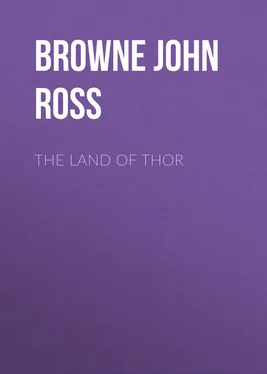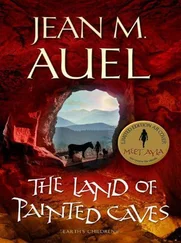John Browne - The Land of Thor
Здесь есть возможность читать онлайн «John Browne - The Land of Thor» — ознакомительный отрывок электронной книги совершенно бесплатно, а после прочтения отрывка купить полную версию. В некоторых случаях можно слушать аудио, скачать через торрент в формате fb2 и присутствует краткое содержание. Жанр: foreign_antique, foreign_prose, Путешествия и география, на английском языке. Описание произведения, (предисловие) а так же отзывы посетителей доступны на портале библиотеки ЛибКат.
- Название:The Land of Thor
- Автор:
- Жанр:
- Год:неизвестен
- ISBN:нет данных
- Рейтинг книги:4 / 5. Голосов: 1
-
Избранное:Добавить в избранное
- Отзывы:
-
Ваша оценка:
- 80
- 1
- 2
- 3
- 4
- 5
The Land of Thor: краткое содержание, описание и аннотация
Предлагаем к чтению аннотацию, описание, краткое содержание или предисловие (зависит от того, что написал сам автор книги «The Land of Thor»). Если вы не нашли необходимую информацию о книге — напишите в комментариях, мы постараемся отыскать её.
The Land of Thor — читать онлайн ознакомительный отрывок
Ниже представлен текст книги, разбитый по страницам. Система сохранения места последней прочитанной страницы, позволяет с удобством читать онлайн бесплатно книгу «The Land of Thor», без необходимости каждый раз заново искать на чём Вы остановились. Поставьте закладку, и сможете в любой момент перейти на страницу, на которой закончили чтение.
Интервал:
Закладка:
But to proceed. Sleep was effectually banished from my eyes, and no wonder. Who in the name of sense could sleep with forty tumblers of Russian tea – to say nothing of the dashes that were put in it – simmering through every nook and cranny of his body, and boiling over in his head? There I lay, twisting and tumbling, the pillow continually descending into the depths of infinity, but never getting any where – the bed rolling like a dismantled hulk upon a stormy sea – the room filled with steaming and hissing urns – a fearful thirst parching my throat, while myriads of horrid bearded Russians were torturing me with tumblers of boiling-hot tea dashed with vodka – thus I lay a perfect victim of tea. I could even see Chinamen with long queues picking tea-leaves off endless varieties of shrubs that grew upon the papered walls; and Kalmuck Tartars, with their long caravans, traversing the dreary steppes of Tartary laden with inexhaustible burdens of the precious leaf; and the great fair of Nijni Novgorod, with its booths, and tents, and countless boxes of tea, and busy throngs of traders and tea-merchants, all passing like a panorama before me, and all growing naturally out of an indefinite background of tea.
I can not distinctly remember how long I tossed about in this way, beset by all sorts of vagaries. Sometimes I fancied sleep had come, and that the whole matter was a ridiculous freak of fancy, including my visit to Moscow – that Russian tea was all a fiction, and vodka a mere nightmare; but with a nervous start I would find myself awake, the palpable reality of my extraordinary condition staring me in the face. Unable to endure such an anomalous frame of mind and body any longer, I at length resolved to go down and take an airing in the streets, believing, if any thing would have a beneficial effect, it would be the fresh air. Acting upon this idea, I hastily dressed myself and descended to the front door. The Hotel de Venise is situated in a central part of the city, at no great distance from the Kremlin. It stands back in a large open yard, with a very pretty garden to the right as you enter from the main street. The proprietor is a Russian, but the hotel is conducted in the French style, and, although not more conspicuous for cleanliness than other establishments of the same class in Moscow, it is nevertheless tolerably free from vermin. The fleas in it were certainly neither so lively nor so entertaining as I have found them at many of the Spanish ranches in California, and the bugs, I am sure, are nothing like so corpulent as some I have seen in Washington City. I throw this in gratis, as a sort of puff, in consideration of an understanding with the landlord, that if he would refrain from cheating me I would recommend his hotel to American travelers. It is very good of its kind, and no person fond of veal, as a standard dish, can suffer from hunger at this establishment so long as calves continue to be born any where in the neighborhood of Moscow.
The porter, a drowsy old fellow in livery, whose only business, so far as I could discover, was to bow to the guests as they passed in and out during the day, at the expense of a kopek to each one of them for every bow, napping on a lounge close by the front door. Hearing my footsteps, he awoke, rubbed his eyes, bowed habitually, and then stared at me with a vacant and somewhat startled expression. It was not a common thing evidently for lodgers to go out of the hotel at that time of night, or rather morning – it must have been nearly two o’clock – for, after gazing a while at what he doubtless took to be an apparition or an absconding boarder whose bill had not been settled, he grumbled out something like a dissent, and stood between me and the door. A small fee of ten kopeks, which I placed in his hand, aided him in grasping at the mysteries of the case, and he unlocked the door and let me out, merely shaking his head gravely, as if he divined my purpose, but did not altogether approve of it in one of my age and sedate appearance. In that, however, he was mistaken: I had no disposition to form any tender alliances in Moscow.
The streets were almost deserted. An occasional drosky, carrying home some belated pleasure-seeker, was all that disturbed the silence. I walked some distance in the direction of the Kremlin. The air was deliciously cool and refreshing, and the sky wore a still richer glow than I had noticed a few hours before at the gardens of the Peterskoi. The moon had not yet gone down, but the first glowing blushes of the early morning were stealing over the heavens, mingled with its silvery light. I took off my hat to enjoy the fresh air, and wandered along quite enchanted with the richness and variety of the scene. Every turn of the silent streets brought me in view of some gilded pile of cupolas, standing in glowing relief against the sky. Churches of strange Asiatic form, the domes richly and fancifully colored; golden stars glittering upon a groundwork of blue, green, or yellow; shrines with burning tapers over the massive doors and gateways, were scattered in every direction in the most beautiful profusion. Sometimes I saw a solitary beggar kneeling devoutly before some gilded saint, and mourning over the weariness of life. Once I was startled by the apparition of a poor wretch lying asleep – I thought he was dead – a crippled wreck upon the stone steps – his eyes closed in brief oblivion of the world and its sorrows, his furrowed and pallid features a ghastly commentary upon the glittering temples and idols that surround him. For above all these things that are “decked with silver and with gold, and fastened with nails and with hammers that they move not,” there is One who hath “made the earth by His power and established the world by His wisdom;” man is but brutish in his knowledge; “every founder is confounded by the graven image; for his molten image is falsehood, and there is no breath in them.” Such extremes every where abound in Moscow – magnificence and filth; wealth and poverty; a superstitious belief in the power of images in the midst of abject proofs of their impotence. And yet, is it not better that men should believe in something rather than in nothing? The glittering idol can not touch the crippled beggar and put health and strength in his limbs, but if the poor sufferer can sleep better upon the cold stones in the presence of his patron saint than elsewhere, in charity’s name let him,
“O’erlabored with his being’s strife
Shrink to that sweet forgetfulness of life.”
I wandered on. Soon the cupolas of the mighty Kremlin were in sight, all aglow with the bright sheen of the morn. Passing along its embattled walls, which now seemed of snowy whiteness, I reached the grand plaza of the Krasnoi Ploschod. Standing out in the open space, I gazed at the wondrous pile of gold-covered domes till my eyes rested on the highest point – the majestic tower of Ivan Veliki. And then I could but think of the terrible Czar – the fourth of the fierce race of Ivans, who ruled the destinies of Russia; he who killed his own son in a fit of rage, yet never shook hands with a foreign embassador without washing his own immediately after; the patron of monasteries, and the conqueror of Kazan, Astrakan, and Siberia. This was the most cruel yet most enlightened of his name. I am not sure whether the tower was built to commemorate his fame or that of his grandfather, Ivan the Third, also called “the Terrible,” of whom Karasmin says that, “when excited with anger, his glance would make a timid woman swoon; that petitioners dreaded to approach his throne, and that even at his table the boyars, his grandees, trembled before him.” A terrible fellow, no doubt, and thoroughly Russian by the testimony of this Russian historian, for where else will you find men so terrible as to make timid women swoon by a single glance of their eye? Not in California, surely! If I were a Czar this soft summer night (such was the idea that naturally occurred to me), I would gaze upon the fair flowers of creation with an entirely different expression of countenance. They should neither wilt nor swoon unless overcome by the delicacy and tenderness of my admiration.
Читать дальшеИнтервал:
Закладка:
Похожие книги на «The Land of Thor»
Представляем Вашему вниманию похожие книги на «The Land of Thor» списком для выбора. Мы отобрали схожую по названию и смыслу литературу в надежде предоставить читателям больше вариантов отыскать новые, интересные, ещё непрочитанные произведения.
Обсуждение, отзывы о книге «The Land of Thor» и просто собственные мнения читателей. Оставьте ваши комментарии, напишите, что Вы думаете о произведении, его смысле или главных героях. Укажите что конкретно понравилось, а что нет, и почему Вы так считаете.











